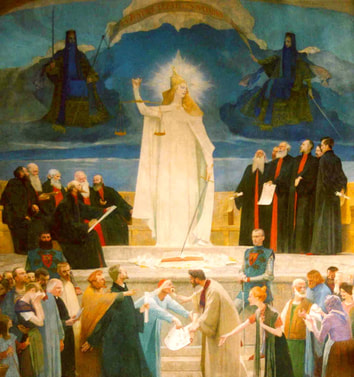 To view a video of this presentation, click here. To view a PowerPoint presentation of this article, click here. To listen to the audio of this presentation, click here. To view this article as a tract, click here. Despite anti-Christian prejudices, it is to the teachings and example of Jesus Christ that women owe most of their freedoms. The advent of Christianity raised the dignity, freedom and rights of women to levels never before known in any other culture or religion. Indeed, as one historian put it: “The birth of Jesus was the turning point in the history of women.” As a result of the teachings and example of Jesus Christ, women in much of the world today, especially in the West, enjoy far more privileges and rights than at any other time in history. Women in the Middle East By way of contrast, one only needs look at how women are treated in those countries where Christianity has had little influence, for example in the Muslim Middle East. Christian women have been publicly stripped and flogged in Sudan for failing to wear the Islamic Abaya (a black garment that covers the head, face and the entire body). Under the Taliban in Afghanistan women were forbidden to go to school, to work outside the home, or even to walk without their whole face and head being covered under the Abaya. Women have been arrested and jailed in Iran for wearing lipstick. In Saudi Arabia, it is illegal for women to drive a motor vehicle. 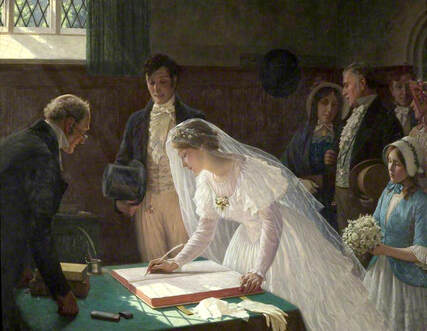 The Perversity of Polygamy Polygamy is also widely practiced in non-Christian religions. Christianity has always rejected polygamy because it inhibits and in fact exterminates, exclusive, devoted love. Christians have always maintained that love between a man and a woman ought to be exclusive, otherwise, marriage is degraded in essence to mere physical lust. No woman who loves her husband and wishes to be fully loved in return can tolerate “another wife”. Monogamy gives recognition, status and value to a woman. (Yet Muhammad, for example, had at least 16 wives and 2 concubines. Muhammad’s successor, Caliph Umar married 7 women and had 2 slave concubines. The Caliph Uthman married 8 women. The Caliph Ali (Muhammad’s son-in-law) had 11 wives and 19 slave concubines. Muhammad’s grandson, Hassan, married 70 women and had at least 31 children. Muhammad also authorised “temporary marriages” (“for three nights or more”). Thereafter the man could desert the “wife” leaving her without any rights or obligations, even with regard to any offspring, who would have no claim to inheritance or support). By approving of polygamy, mistresses, underaged “brides” and “temporary marriages”, for example, Islam denies the value of a genuine marriage, based on exclusive, lifelong, devoted love. Polygamy also erodes the concept of a Biblical family. Christianity has always maintained that monogamy alone gives the recognition, status and value that a woman needs and the environment for raising children in a stable and loving home. 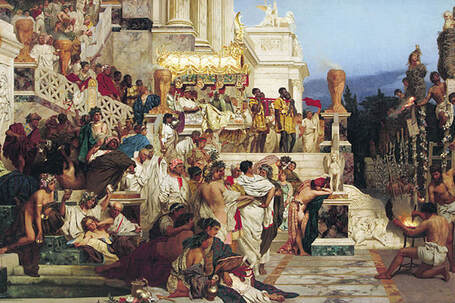 The Depravity of Rome Few people appreciate how highly promiscuous and depraved cultures were before the advent of Christianity. British historian, Edward Gibbon, stated in his “History of the Decline and Fall of the Roman Empire” that marital faithfulness in the Roman Empire was virtually unknown. Not only were adultery and fornication common, but obscene sexual practices were prevalent. Even the most depraved and obscene sexual acts were shamelessly illustrated on household items such as lamps, bowls, cups and vases. The Romans and Greeks also exercised and bathed publicly in the nude. The Roman writer, Ovid, noted that sexual relations had become sadistic and masochistic. Catullus, a Roman writer, referred to the prevalence of Romans practicing group sex orgies. Suetonius reported that the Emperor Tiberius had nude women wait on his tables while he dined. Tiberius also had male and female prostitutes openly engage in group sex as entertainment for his pleasure. The Emperor Caligula was given to incest with all of his sisters, engaged in sex while he ate and often had people tortured during his orgies. The Emperor Titus surrounded himself with all manner of perversities. The Emperor Domitian engaged in incestuous relations. Emperor Commodus had a harem of 300 concubines and 300 young boys to satisfy his trans-sexual appetites. Homosexuality and paedophilia were rampant in Rome and Greece. Tiberius, Nero, Galba, Hadrian, Commodus and many other emperors engaged in widespread homosexual perversions and what would today be classified as child molestation. Decadent plays, including live sex, mutilation and bestiality on the stage, became common during the reigns of Nero and Trajan. 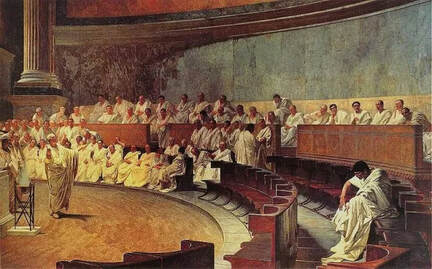 Double Standards and Hypocrisy The Roman Lex Julia de Adulteriis defined adultery only on the basis of the marital status of the woman. A married man could not be guilty of adultery if he had sex with a single woman. Adultery was perceived as a crime that only a woman could commit against the husband. In Roman law adultery was a property crime against the husband, not an ethical issue which applied to either single or married men. A Revolution of Love Into this decadent environment the Christian message and lifestyle came as radical, revolutionary and very offensive. “You shall not commit adultery” Exodus 20:14; “Marriage should be honoured by all and the marriage bed kept pure, for God will judge the adulterer and all the sexually immoral” Hebrews 13:4; “The husband should fulfil his marital duty towards his wife and likewise the wife to her husband” 1 Corinthians 7:3; “Submit to one another out of reverence for Christ” Ephesians 5:21; “Be considerate as you live with your wives and treat them with respect” 1 Peter 3:7.  Marital Faithfulness – A Christian Innovation Not only did the Christians maintain that marriage should be between one man and one woman for life, but they insisted that sexual relations had to be confined to marriage. They also believed that the sex act made the couple “one flesh.” This very radical concept required married couples to remain totally faithful to one another. Extramarital sex was not only unfaithfulness to one’s marriage partner, but it was in violation of God’s express command and it did violence to the “one flesh” concept. By rejecting polygamy, adultery, fornication, public nudity and the artistic portrayed of sexual acts, either openly on stage, or graphically portrayed on household items, the Christians instituted an entirely new sexual morality. As secular historian, Edward Gibbon declared: “The dignity of marriage was restored by the Christians.” (The Decline and Fall of the Roman Empire).  Reforming Marriage Christianity greatly elevated the world’s sexual morality. By opposing adultery, fornication, homosexuality, child molestation, bestiality and other sexual decadence, Christianity made a contribution to civilisation that was unprecedented. It was as a result of the tireless work of Christians that by the 5th Century the wife was able to divorce an adulterous husband, something which had never before occurred in the Ancient world. Christianity equalised the crime of adultery and brought dignity and beauty to the formal wedding ceremony. Prior to Christianity marriage ceremonies were anything but dignified. In keeping with the low regard of women and marriage as a whole, obscene songs, mockery and open displays of extreme decadence were part and parcel of Roman weddings. However, from the 4th Century, Christianity brought about a revolution in the state’s view of marriage, introducing a dignity, beauty and solemnity to weddings which had never before been seen. The belief that marriage is a Divine institution, a sacrament, stems from Christianity (The History of Marriage, by Edward Westermarck).  Protecting Children from Paedophilia The abhorrence which Western society still generally holds for paedophilia (the sexual molestation of children) is a direct result of Christianity. Prior to Christianity, paedophilia and homosexuality were completely accepted by Roman and Greek society. Roman and Greek plays, novels, artwork and even the writings of their philosophers, reveal an acceptance and often an obsession, with pederasty. The Roman emperors Tiberius, Nero, Galba, Hadrian, Commodus, amongst many others, were renowned for their numerous homosexual liaisons with children. Bisexuality, perversion and sexual deviance was widespread throughout the pagan culture of the Greeks and Romans. The Pagan Practise of Perversion Walter Williams in his book “The Spirit and the Flesh” sympathetically focuses on the prevalent homosexuality amongst the American Indians: The Kwakiutl, Crows, Klamaths, Hopi, Sioux, Navajo, Zuni, Yokuts and other tribes in the Americas all practiced homosexuality before Christianity came to the Americas. Often homosexual acts were part of the religious ceremonies performed by the shamans.  Biblical Principles that Transformed Civilisation It was the clear Biblical teaching against such immorality that revolutionised Western civilisation: “Do not lie with a man as one lies with a woman; that is detestable.” Leviticus 18:22; “If a man lies with a male as he lies with a woman, both of them have committed an abomination. They shall surely be put to death. Their blood shall be upon them.” Leviticus 20:13; “Do not be deceived; neither the sexual immoral nor idolaters, nor adulterers, nor male prostitutes, nor homosexual offenders, nor thieves, nor the greedy, nor drunkards, nor slanderers, nor swindlers will inherited the Kingdom of God.” 1 Corinthians 6:9-10; “The wrath of God is being revealed from heaven against all the godlessness and wickedness of men who suppress the truth by their wickedness… shameful lusts. Even their women exchanged natural relations for unnatural ones. In the same way the men also abandoned natural relations with women and were inflamed with lust for one another. Men committed indecent acts with other men and received in themselves the due penalty for their perversion…they have become filled with every kind of wickedness, evil, greed and depravity. They are full of envy, murder, strife, deceit and malice. They are gossips, slanderers, God haters, insolent, arrogant and boastful. They invent ways of doing evil; they disobey their parents, they are senseless, faithless, heartless, ruthless. Although they know God’s righteous decree that those who do such things deserve death, they not only continue to do these very things but also approve of those who practice them.” Romans 1:18-32.  Elevating Ethics It is a historical fact that the outlawing of adultery, homosexuality, paedophilia and other immorality, is the result of the influence of Christianity. The Biblical doctrine that sexual intimacy was a holy gift of God, only to be enjoyed between a husband and wife within the context of marital privacy, was a revolutionary Christian concept. Historians note that the Christian concern for the privacy of marital sex essentially led to the institutionalisation of privacy. Privacy has strong Christian roots. (“Privacy in A Public Society”, by Richard Hixson). Hannah Arendt in “The Human Condition” maintains that “there is a marked relationship between the rise of Christianity and the rise of privacy.” A Temple of the Holy Spirit The Christian teaching that “the body is not meant for sexual immorality, but for the Lord and the Lord for the body” 1 Corinthians 6:13 and that the body is “a temple of the Holy Spirit” 1 Corinthians 6:19 led Christians to condemn and in time to outlaw, adultery, paedophilia, homosexuality, bestiality, pornography and other decadence which had once been prevalent and accepted in pre-Christian cultures.  Pagan Resentment St. Augustine in “The City of God” observed that the Romans despised the Christians because of Christian opposition to their unrestrained sexual depravities. The church father Tertullian noted the Romans were so incensed by Christian opposition to their immoralities that they hated the very name “Christian.” Professor Alvin Schmidt in his “How Christianity Changed the World” observes: “The hateful attitudes that were once directed against the early Christians seem to be returning and for similar reasons, despite the current attention given to toleration. Increasingly, Christians are hated by many who advocate ‘hate crime’ laws. In large measure, they are hated because they seek to honour God and His laws rather than ‘re-define god as our future selves’…as feverish efforts are underway to bring back the sexual debauchery of ancient paganism.” To appreciate the revolutionary impact of Jesus Christ in the history of women and to understand how radical His teaching and conduct towards women was to the ancient world, we need to understand the historically low status of women before the time of Christ.  Women in Ancient Greece Respectable Greek women were not permitted to leave their house unless accompanied by a male escort. When guests were present in the home, the wife was not permitted to eat at the same table or interact with the guests. The wife had to be unseen and confined to her quarters (gynaecium). The average Athenian woman had the social status of a slave. Whereas the husband could divorce the wife at any time, the wife could not divorce her husband. Girls did not go to school at all. Throughout a woman’s entire life, she was not permitted to speak in public. As Sophocles wrote: “Silence is an adornment to women”; Euripides asserted: “Silence and discretion are most beautiful in women and remaining quiet within the house”. Aristotle declared: “Silence gives grace to women”. Homer wrote: “Speech shall be for men”. Euripides wrote: “Women, specious curse to man”. Aeschylus wrote: “Evil of mind are they and guileful of purpose, with impure hearts”. Aristophanes wrote: “For women are a shameless set, the vilest of creatures going”. Homer wrote: “One cannot trust women!” Greek civilisation accorded an extremely low status to women, not allowing them to have any meaningful social life in public, or in the presence of men, even in private. Women had little or no social value. Female infanticide was commonplace. Baby girls were expendable. Female babies were seen as “an economic liability, a social burden” (How Christianity Changed the World).  Women in Ancient Rome Similarly, in Roman society women had none of the rights and privileges that men enjoyed. Roman wives were not allowed to be present with a husband’s guest at a meal. A married woman was under the Roman law of Manus which placed her under the absolute control of her husband who could divorce her, or sell her into slavery, or kill her at will. A woman under Manus was legally prohibited from inheriting property. Under Patria Potestas women were prohibited from speaking in public. Women were not allowed to speak in court. Under the Roman law of Pater familias, a man had supreme, absolute power over his children. He could even execute his married daughter. He had full authority to chastise, even to beat to death, his wife, even his grown children, including grand-children. Freedom in Christ These laws were strongly criticised by the early church fathers, including St. Augustine, the bishop of Hippo. From the very beginning, the Christians opposed infanticide and rescued and adopted many of the abandoned babies. “There is neither Jew nor Greek, slave nor free, male nor female, for you are all one in Christ Jesus.” Galatians 3:28  Women in Hebrew Culture This Christian teaching was not only radical in the Ancient Greek and Roman world, but also in the Hebrew culture prevalent at that time. The Rabbinic Oral Law (now recorded in the Talmud and Midrash) not only barred women from speaking in public and reading the Law (Torah), but women were also forbidden from testifying in court. As one Rabbinic teaching put it: “It is shameful” to hear a woman’s voice in public (Berakhoth 24A). Another Rabbinic teaching asserted: “Let the words of the Law (Torah) be burned rather than be committed to a woman… If a man teaches his daughter the Law, it is as though he taught her lechery” (Sotah 3.4) For this reason, synagogue worship was meant to consist only of male participants. Women, if present, were to be passive listeners, separated from the men by a “michetza” (partition). These women were never to raise their voices. Only the men were to do the singing or chanting. It was only by the late 18th Century in Reformed synagogues that Jewish women were permitted to sing. 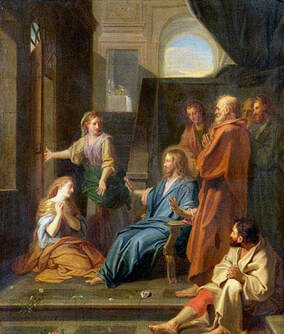 Mary and Martha So, when Mary came and sat at Jesus’ feet (Luke 10:38-42), not only was she being a cultural deviant, but so too was the Lord Jesus, because he clashed with the Rabbinic teachings of His day. When her sister Martha complained about her not helping her, Jesus again violated Rabbinic teaching by siding with Mary and commending her for desiring teaching about God’s Law. At the grave of Lazarus, Jesus taught Martha: “I am the Resurrection and the Life. He who believes in Me will live even though he dies; and whoever lives and believes in Me will never die. Do you believe this?” (John 11:25-26). Under Rabbinic law, to teach a woman was bad enough, but the Lord Jesus did more than that, He called for a public verbal response from Martha.  The Samaritan Woman Similarly, the way in which the Lord Jesus interacted with the Samaritan woman at the well (John 4) may not appear so unusual to Westerners today. Yet, to the prevailing Greek, Roman and Hebrew cultures of that time, our Lord’s actions must have been quite shocking. Jesus not only ignored the Jewish anti-Samaritan prejudices, but He violated the customs that prohibited a man from speaking to a woman that was not a relative. The Samaritan woman herself was shocked: “You are a Jew and I am a Samaritan woman. How can you ask me for a drink? (for Jews do not associate with Samaritans)” John 4:9. The Rabbinic law of the time was quite explicit: “He who talks with a woman in public brings evil upon himself” (Aboth 1.5) and “One is not so much as to greet a woman” (Berakhoth 43b). One can imagine then why the Lord’s “disciples were surprised to find Him talking with a woman” John 4:27. New Respect and Status By the Lord Jesus granting women a previously unknown respect and status, He not only broke with the anti-female culture of His era, but He set a high standard for His followers to emulate. The actions and teachings of Jesus raised the status of women to new heights, to the consternation and dismay of both His friends and enemies. By word and deed Christ went against the ancient accepted practices that stereotyped women as socially, intellectually and spiritually inferior. Truly our Lord came “that you may have life and have it in abundance” John 10:10 and “indeed there are those who are last who will be first and first who will be last.” Luke 13:30  New Testament Women The Gospels record that many women followed Jesus (Mark 15:41; Luke 8:1-3). After His resurrection from the dead, our Lord first appeared to several women (including Mary Magdalene, Joanna and Mary the mother of James, Luke 24:10). “Then Jesus said to them: ‘Do not be afraid. Go and tell My brothers…” Matthew 28:10. It is noteworthy that women were the last at the cross (Mark 15:47); the first at the tomb (John 20:1); the first to proclaim the Resurrection (Matthew 28:8) and the first to witness to the Jews (Luke 2:37-38). Women attended the very first prayer meeting (Acts 1:14); women were the first to welcome Christian missionaries to Europe (Acts 16:13) and the first European convert was a woman (Acts 16:14). In the early Church, women were not only very prominent but were frequently honoured: Elizabeth (Luke 1:43); Mary (Luke 1:30-38); Mary of Bethany (Matthew 26:13; Luke 10:42); the Samaritan evangelist (John 4:29); Dorcas (Acts 9:36); Lydia, the business woman and the first European convert (Acts 16:14-15); “Apphia our sister” (Philemon 2); “Nympha and the church in her house” (Colossians 4:15); Phoebe “a servant of the Church in Cenchrea…she has been a great help to many people including me.” (Romans 16:1-2). Women Co-workers of the Apostle Paul In His epistles, the apostle Paul mentions numerous female co-workers including “Priscilla… and her fellow workers in Christ Jesus” Romans 16:3; “…Mary, who worked very hard for you.” Romans 16:6; “Tryphema and Tryphosa, those women who work hard in the Lord…Persis, another woman who has worked very hard in the Lord.” Romans 16:12; “…Euodia and… Syntyche… the women who have contended at my side in the cause of the Gospel along with Clement and the rest of my fellow workers…” Philippians 4:2-3  Freedom and Dignity As Dr. Schmidt (Under the Influence) observes: “Jesus, Paul and the early Church broke the ancient bonds that kept women secluded and silent (as in Athenian society), subservient (as under the Roman law of Patria Potestas and Manus) and silent and segregated in public worship (as in the Jewish culture). The freedom and dignity that the early Christians gave to women is also evident by their having access equal with men to baptism and the Lord’s Supper… Christ’s message of repentance and salvation proclaimed by the Apostles had revolutionary effects on the lives of women. The early Christians not only included women in the life of the Church, but they also gave them a freedom and dignity unknown in the Greco-Roman and Judaic cultures.” Far from Christianity being “anti-women” as many critics allege, women in the early Church soon outnumbered men to such a degree that there were simply not enough Christian men available for marriage. Celsus, a 2nd Century critic of Christianity ridiculed the believers by saying that Christianity was a religion that attracted women. To him, this was a sign of weakness. Numerous Roman authors saw Christianity providing dignity and freedom to women as a threat to the entire social order. Christianity revolutionised marriage by seeing the wife as a partner, commanding husbands to love their wife as Christ loved the Church (Ephesians 5:25) and allowing Christian women the choice as to whom they married. Christianity also granted women the right to divorce unfaithful or abusive husbands. Women also received for the first-time guardianship over their children who previously were the sole possession of the man.  Removing the Veil Christianity also pioneered other freedoms for women including the removal of the veil. Women at the time of Christ were veiled by the Assyrians, Babylonians, Chinese, Egyptians, Greeks, Hebrews, Romans and Samarians. There were cases of Romans divorcing their wives for leaving the house unveiled. Greek women were required to wear a veil after marriage. Even among the Hebrews, the Rabbis taught that it is a “godless man who sees his wife go out with her head uncovered. He is duty bound to divorce her” (Kethuboth 2). However, the lack of any specific reference in the Gospels, or anywhere in the New Testament, to women having to veil their face, led the Church to increasingly discontinue the practice. While Paul, in 1 Corinthians 11, urged the women in Corinth to cover their heads in church, he made no reference to veiling their faces. In 1 Timothy 2:8-9, where Paul tells the woman to dress modestly and not to elaborately braid their hair, he makes no mention of any veil. So, worldwide Christianity has led the trend to dispense with the veil. Freedom from Foot Binding Similarly, the Chinese practice of foot binding, where girls from an early age had to have their feet tightly bound, forcing the four smaller toes of each foot up and under against the fleshly part of the foot (frequently causing severe infection and even on occasion, gangrene), was only abolished under the influence of Christianity. This cruel custom, which crippled many Chinese women, was only outlawed by the Chinese government in 1912. It was Christian missionaries who led the crusade to abolish foot binding in China. Barbaric Rituals Abolished The widespread practice of clitoridectomy (often erroneously called female circumcision) is another cruel age old cultural practice, which has been outlawed in all countries where Christianity has become the majority religion. The only countries in the world where this barbaric ritual is still practiced are countries where Christianity has little, or no, influence. 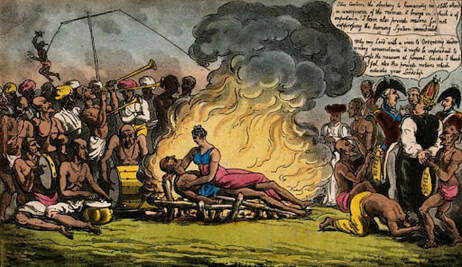 Saving Widows from Suttee Before the coming of Christ, widows were ostracised, despised and frequently buried, or burned, alive at their husband’s death. For countless centuries, India’s cultural custom of suttee (or sati), the burning alive of widows, was an integral part of Hindu culture. By God’s grace, as a result of the tireless efforts of Christian missionary William Carey, the British authorities in 1829 outlawed the practice of suttee. When this ban went into effect, many Indians “cried that the foundations of Hindu society would be shaken if widows were not burned alive.” (India – A Short Cultural History). Others argued that the British ban on suttee violated Article 25 of India’s constitution that gave people freedom of religion (Sati, Widow Burning in India). This legal ban on suttee (known as Carey’s Edict) is still in effect today, although since the 1990’s there have been numerous attempts to revive the custom with open glorification of suttee widow burning and instances of teenage widows being cremated on their husband’s funeral pyres. Dr. Schmidt notes: “In light of the current, almost worldwide promotion of multi-culturalism, which argues that all cultures and religious are essentially equal, the desire and efforts to bring back India’s pagan custom of suttee may gain momentum in the future.” (How Christianity Changed the World). History records, that before the coming of Christianity, widows were burned by American Indian tribes, by the Maori in New Zealand and by the Chinese. 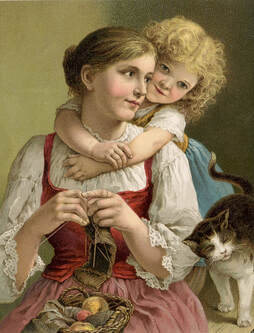 Compassion for Widows However, Jesus had particular compassion on the widows. Christ rebuked the Pharisees for taking financial advantage of widows (Mark 12:40). Christ praised the widow who, although poor, gave two coins in her offering: “I tell you the truth, He said, this poor widow has put in more than all the others.” Luke 21:3. Christ had compassion on the widow of Nain (Luke 7:11-15). In 1 Timothy 5:3-4, Paul urges Christians to honour and care for the widows. In James 1:27 we are taught that “religion that God our Father accepts as pure and faultless is this: to look after… widows in their distress.” When one understands how atrociously women were once abused in pre-Christian cultures, then one can understand why historians have declared that “the birth of Jesus was the turning point in the history of women” and “the conversion of the Roman world to Christianity brought a great change in women’s status.” (How Christianity Changed the World). “Charm is deceptive and beauty is fleeting; but a woman who fears the Lord is to be praised.” Proverbs 31:30  A Legacy of Liberty Because of the teachings and actions of our Lord Jesus Christ over the centuries, Christianity has progressively achieved greater respect, dignity, honour and protection for women. It is to Christianity that we owe marriage as a mutual partnership, the rejection of polygamy and the promotion of monogamy and marital faithfulness as the cultural ideal. In granting women respect, dignity and protection, Christianity broke with the prevalent anti-female prejudices of the Ancient world, of pagan cultures and Eastern religions. All the freedoms and advantages that women enjoy today are as a result of the teachings and example of Jesus Christ and the progressive work through the centuries of the Church.  However, if present anti-Christian trends continue one could see a return to the previous pagan abuses of women. Those advocating pornography, sexual permissiveness, homosexual “marriages,” legalised prostitution, lowered age of consent and the decriminalisation of adultery are not offering us progress, but only a return to pre-Christian paganism. “…remember the Lord Who is great and awesome and fight for… your daughters, your wives and your homes…” Nehemiah 4:14 Dr. Peter Hammond Africa Christian Action PO Box 23632 Claremont 7735 Cape Town South Africa Tel: 021-689 4480 [email protected] www.christianaction.org.za www.livingstonefellowship.co.za Sources: How Christianity Changed the World by Dr. Alvin Schmidt What if Jesus Had Never Been Born? by Dr. James Kennedy and Jerry Newcombe To view this article as a tract, click here. See also: Click here to view and share our video: Stop Human Trafficking. Click here to listen to a radio interview on Human Trafficking Today – Women at Risk. To download Stop the Traffick tract, in colour, click here, for black and white, click here. Fight the New Drug tract. Beveg Die Nuwe Dwelm tract. Women Need Protection and Respect tract. Vroue Verdien Beskerming en Respek tract. Women’s Day Awareness Campaigns Against Human Trafficking Trade of Innocents DVD resource (obtain through CLB www.ChristianLibertyBooks.co.za) Nefarious: Merchant of Souls on YouTube, or pay to live stream from Exodus Cry (obtain through CLB) Exposing and Opposing Slavery Today video How the Media is Sexualising Your Children
0 Comments
Leave a Reply. |
More Articles
All
Archives
July 2024
|
"And Jesus came and spoke to them, saying, “All authority has been given to Me in heaven and on earth.
Go therefore and make disciples of all the nations, baptizing them in the name of the Father and of the Son and of the Holy Spirit,
teaching them to observe all things that I have commanded you; and lo, I am with you always, even to the end of the age.” Amen.” Matthew 28: 18-20
Go therefore and make disciples of all the nations, baptizing them in the name of the Father and of the Son and of the Holy Spirit,
teaching them to observe all things that I have commanded you; and lo, I am with you always, even to the end of the age.” Amen.” Matthew 28: 18-20
|
P.O.Box 74 Newlands 7725
Cape Town South Africa |
|
 RSS Feed
RSS Feed
